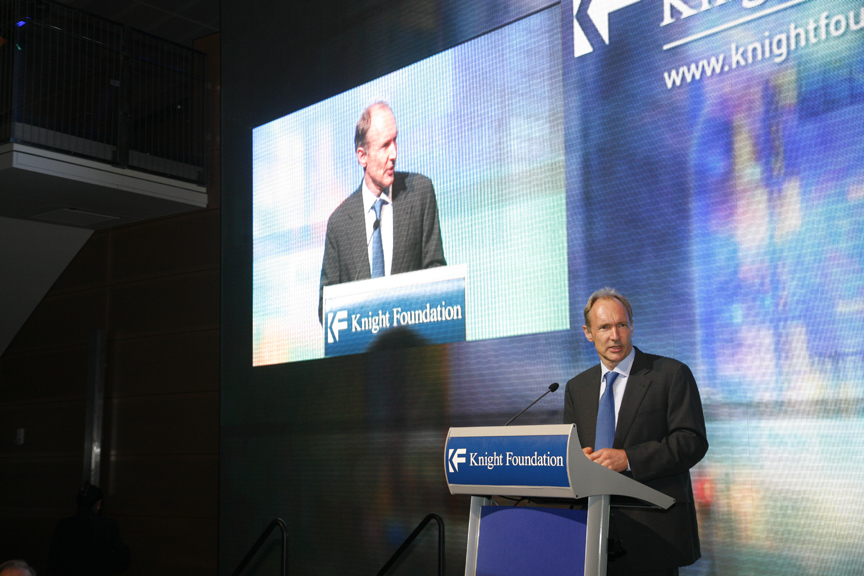
The World Wide Web Consortium at 20: Moving the Web toward its ‘full potential’
Above: World Wide Web inventor Sir Tim Berners-Lee welcomes a Knight grant establishing the World Wide Web Foundation in 2008 at The Newseum. Credit: Scott Henrichsen.
In a mere 25 years, the Web has become critical infrastructure for enabling human expression. Indeed, a number of countries (including Costa Rica, France, Estonia and Finland) have taken the position that Internet access is a human right, and because for many the Web is the primary platform for using the Internet, the Web’s impact on our lives cannot be overstated.
Twenty years ago, I launched the World Wide Web Consortium (W3C) to “lead the Web to its full potential.” The primary activity of the organization is to develop technology standards that enable software, devices and people to communicate. These standards —known by opaque acronyms such as URL, HTTP, HTML5, CSS, WCAG and so on — are the bedrock for many of the systems that we enjoy today, including search engines, social networks and online commerce. Like many standards, Web standards remain largely invisible until they break down and we feel the pain of interoperability failures.
The World Wide Web Consortium is not the only organization working on Web standards, but it is recognized for its commitment to open Web standards that may be implemented by anyone without payment of royalty. This particular W3C policy is one reason the Web has been such a fertile platform for innovation. Knight Foundation is one organization that has concretely recognized W3C’s role in the Internet ecosystem. In 2008, Knight announced a seed grant in support of a new organization launched by W3C: the World Wide Web Foundation. The Web Foundation does not develop Web standards but engages in other activities to promote an open Web available to all.
Today, we know that we are far from reaching the full potential of the Web. Three in five people around the world are not yet connected to the Web. Mass surveillance shows that our security infrastructure is inadequate. We must do more to protect our privacy online, an important consideration for all of us, and a critical one for those who use the Web to foster democracy. Although we have made strides in building a Web that is accessible to people with disabilities and supports the world’s languages, solutions to those challenges must evolve as the Web itself expands from a collection of hyperlinked documents to a rich platform for application development. In these and many other areas, we have so much more to accomplish to protect and enhance the global communications network.
That is why the World Wide Web Consortium has again turned to Knight Foundation for support. Our organizations share many goals: Knight supports “systems and standards for the free flow of information” and pursues “initiatives that sustain journalistic values, such as freedom of expression” and seeks “innovative ways to reach, engage and increase audiences for the arts, including through the use of technology.” W3C’s standards for data privacy and provenance, video, audio, style, graphics, layout, cryptography all help further those goals. Many industries, including mobile, digital publishing, automotive and entertainment, are embracing the Web platform for new devices and new applications, which is driving even more innovation that will promote the free flow of information.
To celebrate the 20th anniversary of the World Wide Web Consortium, to raise awareness about the threats to the Web at its 25th anniversary, and to foster open discussion of how to address these challenges, W3C is organizing the W3C20 Symposium on Oct. 29 in Santa Clara, Calif., supported through the generosity of Knight Foundation and other sponsors.
As I wrote earlier this year, “By working together, I believe we can build a Web that truly is for everyone: one that is accessible to all, from any device, and one that empowers all of us to achieve our dignity, rights and potential as humans. Let’s use this landmark birthday as a crucial step on that path.”
Come to W3C20 (or watch the webcast) and make 2014 the year you take action to shape the Web.
Recent Content
-
Journalismarticle ·
-
Journalismarticle ·
-
Journalismarticle ·


